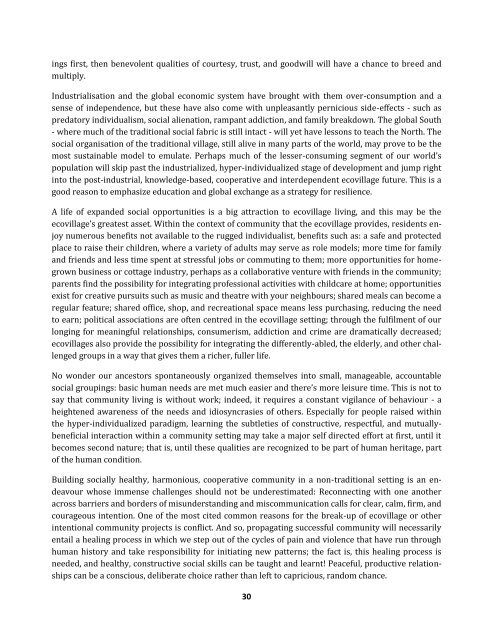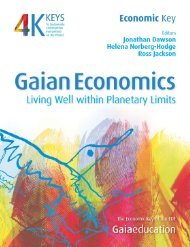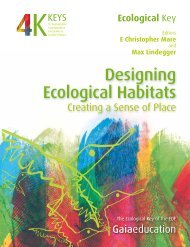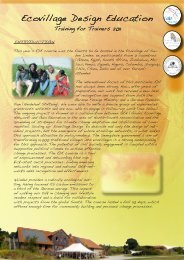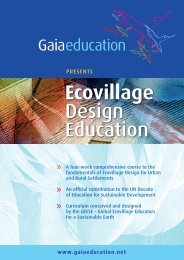EDE Curriculum 2012.pdf - Gaia Education
EDE Curriculum 2012.pdf - Gaia Education
EDE Curriculum 2012.pdf - Gaia Education
Create successful ePaper yourself
Turn your PDF publications into a flip-book with our unique Google optimized e-Paper software.
ings first, then benevolent qualities of courtesy, trust, and goodwill will have a chance to breed and<br />
multiply.<br />
Industrialisation and the global economic system have brought with them over-consumption and a<br />
sense of independence, but these have also come with unpleasantly pernicious side-effects - such as<br />
predatory individualism, social alienation, rampant addiction, and family breakdown. The global South<br />
- where much of the traditional social fabric is still intact - will yet have lessons to teach the North. The<br />
social organisation of the traditional village, still alive in many parts of the world, may prove to be the<br />
most sustainable model to emulate. Perhaps much of the lesser-consuming segment of our world’s<br />
population will skip past the industrialized, hyper-individualized stage of development and jump right<br />
into the post-industrial, knowledge-based, cooperative and interdependent ecovillage future. This is a<br />
good reason to emphasize education and global exchange as a strategy for resilience.<br />
A life of expanded social opportunities is a big attraction to ecovillage living, and this may be the<br />
ecovillage’s greatest asset. Within the context of community that the ecovillage provides, residents enjoy<br />
numerous benefits not available to the rugged individualist, benefits such as: a safe and protected<br />
place to raise their children, where a variety of adults may serve as role models; more time for family<br />
and friends and less time spent at stressful jobs or commuting to them; more opportunities for homegrown<br />
business or cottage industry, perhaps as a collaborative venture with friends in the community;<br />
parents find the possibility for integrating professional activities with childcare at home; opportunities<br />
exist for creative pursuits such as music and theatre with your neighbours; shared meals can become a<br />
regular feature; shared office, shop, and recreational space means less purchasing, reducing the need<br />
to earn; political associations are often centred in the ecovillage setting; through the fulfilment of our<br />
longing for meaningful relationships, consumerism, addiction and crime are dramatically decreased;<br />
ecovillages also provide the possibility for integrating the differently-abled, the elderly, and other challenged<br />
groups in a way that gives them a richer, fuller life.<br />
No wonder our ancestors spontaneously organized themselves into small, manageable, accountable<br />
social groupings: basic human needs are met much easier and there’s more leisure time. This is not to<br />
say that community living is without work; indeed, it requires a constant vigilance of behaviour - a<br />
heightened awareness of the needs and idiosyncrasies of others. Especially for people raised within<br />
the hyper-individualized paradigm, learning the subtleties of constructive, respectful, and mutuallybeneficial<br />
interaction within a community setting may take a major self directed effort at first, until it<br />
becomes second nature; that is, until these qualities are recognized to be part of human heritage, part<br />
of the human condition.<br />
Building socially healthy, harmonious, cooperative community in a non-traditional setting is an endeavour<br />
whose immense challenges should not be underestimated: Reconnecting with one another<br />
across barriers and borders of misunderstanding and miscommunication calls for clear, calm, firm, and<br />
courageous intention. One of the most cited common reasons for the break-up of ecovillage or other<br />
intentional community projects is conflict. And so, propagating successful community will necessarily<br />
entail a healing process in which we step out of the cycles of pain and violence that have run through<br />
human history and take responsibility for initiating new patterns; the fact is, this healing process is<br />
needed, and healthy, constructive social skills can be taught and learnt! Peaceful, productive relationships<br />
can be a conscious, deliberate choice rather than left to capricious, random chance.<br />
30


